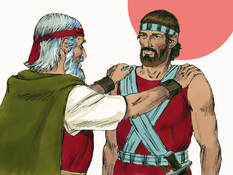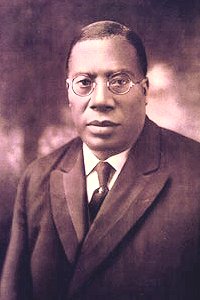Image source: Sweet Publishing / FreeBibleimages.org
"I know that the Lord has given you the land, and that the terror of you has fallen on us ... for the Lord your God, He is God in heaven above and on earth below." (Joshua 2:9-11 excerpts)
"By faith Rahab the harlot did not perish along with those who were disobedient, after she had welcomed the spies in peace." (Hebrews 11:31)
This lesson explains how Rahab of Jericho demonstrated courageous faith in the Lord God. Despite the idolatrous and sinful culture around her, she welcomed the two Israelite spies that Joshua sent, expressed her faith in the Lord to them, and followed their instructions resulting in her deliverance and the deliverance of her family from the destruction of Jericho.
Read. Please read the Bible story of Rahab, the two spies, Rahab's faith, and the deliverance of Rahab and her family in Joshua 2:1-21 and Joshua 6:15-25.
Consider. In what ways did Rahab demonstrate her courageous faith in the Lord by her actions and words?
The scripture quotations in this lesson are taken from the New American Standard Bible (NASB 1995 version) unless noted otherwise (Ref. 1).
1. Rahab's courageous faith in the LordRahab courageously chose to put her faith in the Lord God despite the "idol trusting" culture in which she lived
Rahab's choice to per her faith in the Lord resulted in her being protected and rescued through the coming destruction that the Lord was bringing upon sinful Jericho. Recall that God had instructed Moses and the Israelites to destroy the inhabitants of Canaan because of their sin (Exodus 23:22-24, 27; Deuteronomy 7:1-4, 18:9-13). The inhabitants of Jericho all had heard about the Lord's deliverance of the Israelites through the Red Sea about 40 years prior (Joshua 2:10, Exodus 14:21-22, Joshua 5:6). However, only Rahab turned to faith in the Lord God. Rahab courageously chose to put her faith in the Lord despite being surrounded by the culture of sin and "idol trusting" in which she lived.
Rahab not only turned to faith in the true God, but also put her faith into action. Rahab welcomed in peace the two spies that Joshua had sent (Joshua 2:1, Hebrews 11:31). She, at risk to herself, also hid the two spies from the king's men (Joshua 2:2-7). James, the writer of the epistle that bears his name, commended Rahab for advising the two men to hide in the "hill country" for three days to avoid capture instead of attempting to cross the Jordan and return to Joshua immediately (Joshua 2:16, Joshua 2:22-24, James 2:25-26). As a result of hearing about how the Lord "dried up the water" of the Red Sea before the Israelites, the hearts of Jericho's inhabitants "melted," and "no courage remained in any man" (Joshua 2:11). Even though the scriptures say "no courage remained in any man" [literal male individual] in Jericho, Rahab was a woman of courage, and she turned to the Lord in faith (Strong's Exhaustive Concordance - Ref. 2). Rahab said to the two Israelite spies, "I know that the Lord has given you the land" (Joshua 2:9), and, "the Lord your God, He is God in heaven above and on earth beneath" (Joshua 2:11). Rahab's faith also was commendable in her conversation with the two Israelite spies because she negotiated protection and deliverance not only for herself but also for her family. Rahab requested, "spare my father and my mother and my brothers and my sisters, with all who belong to them, and deliver our lives from death" (Joshua 2:13). On the day of Jericho's destruction, Joshua spared the lives of Rahab's entire family including her father and mother, her brothers and sisters, and all who belonged to them (Joshua 6:22-25). Rahab faithfully accepted and executed the three conditions set by the two spies: a. Condition 1 - That she tie "this cord of scarlet thread" in the window through which she had let them down (Joshua 2:15, 2:18, 2:21). For more information about the literal and symbolic meaning of indelible scarlet dye, check the lesson, "Come Now, Let Us Reason Together (Isaiah 1:18)" (Ref. 3). b. Condition 2 - That she would gather to herself into her house her father and mother and her brothers and her sisters and all her father's household (Joshua 2:12-13, 2:18, 6:22-23). c. Condition 3 - That she would not tell [inform] this business of the two spies (Joshua 2:14, 2:20, Brown-Driver-Briggs Ref. 4). 2. The rest of the Rahab Bible storya. Rahab is in the ancestral lineage of Christ
The rest of the Bible story about Rahab has a very good outcome for Rahab. After Rahab's deliverance from the destruction of Jericho, the Bible tells us that Rahab, a Gentile believer in the Lord God, "lived in the midst of Israel" (Joshua 6:25). The Bible does not mention Rahab's marriage to Salmon of the tribe of Judah. However, the Bible does say that Salmon and Rahab became the parents of Boaz (Matthew 1:5, Ruth 2:1). Subsequently, Rahab became the great-great-grandmother of king David (Ruth 4:21-22, Matthew 1:3-6). The Bible refers to our Savior, Jesus Christ, both as the Son of God (Luke 1:34-35) and as the son of David (Matthew 1:1). Since Rahab is in the ancestral lineage of king David, she also is in the ancestral lineage of our Savior, Jesus Christ.
b. Rahab is in the faith "Hall of Fame" (Hebrews 11)
"By faith Rahab the harlot did not perish along with those who were disobedient, after she had welcomed the spies in peace" (Hebrews 11:31).
In Hebrews chapter 11, the author includes Rahab in the honorable list of people who exemplified great faith. Rahab's inclusion in Hebrews 11 is exceptional in that she is only one of two women mentioned by name in this chapter along with the patriarchs, judges, and prophets that are included. Hebrews 11:11 describes Sarah.
In the Greek in Hebrews 11:31, there is an interesting contrast in the words translated as "faith" and "disobedient." (1). "By faith Rahab"
The Greek word translated as "faith" in Hebrews 11:31 is pistis (pronounced pis'-tis). We think of faith as believing in, trusting in, having confidence in (Strong's Concordance - Ref. 5). However, digging deeper, we see that the root meaning of faith is to be persuaded (HELPs Word-studies - Ref. 5). Rahab was persuaded that the Lord was the true God (Joshua 2:11), and by courageously trusting in him instead of the local idols she and her family were delivered through the destruction of Jericho. See Hebrews 11:6, "And without faith it is impossible to please Him, for he who comes to God must believe that He is and that He is a rewarder of those who seek Him."
(2). "Those who were disobedient"
And now, the surprise. The Greek word for "disobedient" in Hebrews 11:31 is apeitheó [pronounced ap-i-theh'-o] and means refuse to be persuaded (HELPS Word-studies - Ref. 6). Rahab had faith (she was persuaded that the Lord "He is God" - Joshua 2:11), and she was rescued from the destruction of Jericho. Other than Rahab's family, the other residents of Jericho refused to be persuaded about (believe in) God, and they perished (Hebrews 11:31).
Apply. Are you persuaded that "God is" and that he is a rewarder of those who seek him? (Hebrews 11:6). Turn away from trusting any idols in your life (religious idols or secular idols such as money). Put your faith and trust completely in the Lord God and his Son, Jesus Christ, the Messiah (Exodus 20:3, Matthew 6:24).
"And there is salvation in no one else; for there is no other name under heaven that has been given among men by which we must be saved" (Acts 4:12).
Related Lessons
"Come Now, Let Us Reason Together (Isaiah 1:18)" This lesson explains the meaning of "scarlet." Rahab tied a cord of scarlet thread in the window (Joshua 2:18). "Faith Comes from Hearing" - Romans 10:17
References
1. https://www.biblegateway.com/versions/New-American-Standard-Bible-NASB1995/ 2. https://biblehub.com/hebrew/376.htm 3. https://www.scriptureway.com/home/come-now-let-us-reason-together-isaiah-118 4. https://biblehub.com/hebrew/5046.htm 5. https://biblehub.com/greek/4102.htm 6. https://biblehub.com/greek/544.htm
0 Comments
"They all saw Him and were terrified. But immediately He spoke with them and said to them, 'Take courage; it is I, do not be afraid.'" (Mark 6:50) This article is the second in a series on the "'Fear Nots' of the Bible." The first article presented the "'Fear Nots' of the Old Testament" (Ref. 1). In the Old Testament, God assured the Israelites, "Fear not, for I am with you" (Isaiah 41:10). Moses encouraged the Israelites about the Lord's presence with them, "Do not be afraid or tremble at them, for the Lord your God is the one who goes with you. He will not fail you or forsake you" (Deuteronomy 31:6). This article presents statements of Jesus where he tells us to "Fear not" or "Do not be afraid." Jesus Christ, the Son of God, assures those who believe in him and follow him that we have no reason to fear. Consider. In what areas of your life are you afraid? With what circumstances or trials would you like Jesus to give you courage and peace? Definition of Fear Unless indicated otherwise, the verses in this article use the Greek word phobeó for fear or afraid (Ref. 2). The New Testament uses phobeó to mean put to flight (withdraw from), terrify, frighten, dread, or reverence (Ref. 2). Jesus Gives Us Courage in the Midst of Our Trials Recall the event when Jesus walked on the water of Lake Galilee late at night to come to his disciples who were struggling with rowing against the wind (read here, Mark 6:45-52). In Mark 6:48 the Greek language uses a serious word to describe the disciple's situation. The New American Standard Bible says the disciples were straining at the oars for the wind was against them. The Greek word for straining is basanizó, which means a tormenting trial, to examine by using torture (Ref. 3). Wow. Jesus took the initiative and came to his disciples during their tormenting trial at sea (Mark 6:48). The disciples saw Jesus approaching, but did not recognize him at first. They thought he was a ghost, and they were frightened (Mark 6:49-50). Jesus said to them, and he says to us in our trial, "Take courage; it is I, do not be afraid" (Mark 6:50). The Greek word for courage is tharseó, which means emboldened from within (Ref. 4). For the believer, bold courage is infused by the Lord and means "living out the inner confidence (inner bolstering) that is Spirit-produced" (Ref. 4). By faith, Jesus gives us courage (inner boldness and confidence) during our trials. His presence with us calms our storms (Mark 6:51, Mark 4:38-39). Believing in Jesus is the Remedy for Our Fear A synagogue official named Jairus came to Jesus and urgently asked Jesus, "My little daughter is at the point of death; please come and lay Your hands on her, so that she will get well and live" (Mark 5:22-23). While on the way, bad news came from the house of the synagogue official. "Your daughter has died; why trouble the Teacher anymore?" (Mark 5:35). Jesus disagreed with the advice of the bad news bearer to not trust further in Jesus. Jesus immediately said to Jairus, "Fear not, only believe" (Mark 5:36). In the face of bad news, believing in (trusting in, having faith in) Jesus is the only remedy for our grief and fear (Ref. 5, Ref. 6). Jesus knew that he "had things under control." Jairus only needed to believe. Jesus went on to raise Jairus' daughter from the dead (Mark 5:40-42). God Knows Us, Values Us, and Cares for Us Jesus said, "Are not two sparrows sold for a copper coin? And not one of them falls to the ground apart from your Father’s will. But the very hairs of your head are all numbered. Do not fear therefore; you are of more value than many sparrows" (Matthew 10:29-31). English Theologian John Gill (1697 - 1771) wrote, "If God takes care of sparrows and is concerned for their lives, much more will he take care of his faithful ministers, and not suffer their lives to be taken away, till they have done the will and work of their Lord" (Ref. 7, Ref. 8). Jesus Gives Give Us Peace that the World Cannot Give On the evening before his death, Jesus said to his disciples, "Peace I leave with you; My peace I give to you; not as the world gives do I give to you. Do not let your heart be troubled, nor let it be fearful" (John 14:27). Jesus gives his disciples peace. The peace that Jesus gives dispels our fear. The Greek word for peace in John 14:27 is eiréné. Eiréné (peace) is God's gift of wholeness including peace of mind (Ref. 9). The invocation of peace (shalom in Hebrew) also was a common Jewish farewell, in the Hebraistic sense of the health (welfare), security, safety, and prosperity of an individual (Ref. 10, 1 Samuel 1:16-18, 1 Samuel 20:42). The Greek word for fear in John 14:27 is deiliaó, which means to be cowardly (Ref. 11). Deiliaó is used only this one time in the New Testament. Jesus' presence and his words bring comfort, courage, and peace to his disciples then and now. Apply. If you do not yet know Jesus, put your faith and trust in him. Believing in Jesus is the only remedy for your fear. If you do know Jesus, and you are going through a difficult time, pray, and put your trust in Jesus. He will provide you the comfort, courage, and peace that you seek. References
1. http://www.ScriptureWay.com/home/fear-nots-of-the-old-testament 2. https://biblehub.com/greek/5399.htm 3. https://biblehub.com/greek/928.htm 4. https://biblehub.com/greek/2293.htm 5. https://biblehub.com/greek/4100.htm 6. https://biblehub.com/commentaries/mhc/mark/5.htm 7. https://biblehub.com/commentaries/gill/matthew/10.htm 8. https://en.wikipedia.org/wiki/John_Gill_(theologian) 9. https://biblehub.com/greek/1515.htm 10. https://biblehub.com/hebrew/7965.htm 11. https://biblehub.com/greek/1168.htm
"Fear not, for I am with you; Be not dismayed, for I am your God. I will strengthen you, Yes, I will help you, I will uphold you with My righteous right hand." (Isaiah 41:10)
This article is the first in a series on the "'Fear Nots' of the Bible." This article presents God's divinely encouraging "Fear not" and "Do not be afraid" statements from the Old Testament.
Consider. In our troubles and challenges of life, God comes to us and says, "Fear not," and "Do not be afraid." In addition to telling us, "Do not be afraid," God encourages us because God is with us and blesses us in a variety of ways.
God is Our Shield
Genesis 15:1 - "After these things the word of the Lord came to Abram in a vision, saying, 'Do not be afraid, Abram. I am your shield, your exceedingly great reward.'" God is our protector and defense.
God Blesses His People
Genesis 26:24 - "And the Lord appeared to him* the same night and said, 'I am the God of your father Abraham; do not fear, for I am with you. I will bless you and multiply your descendants for My servant Abraham’s sake.'"
* Isaac, Abraham's son The Merriam-Webster Dictionary defines bless as invoke divine care, confer prosperity, protect, and endow with favor (Ref. 1). God Saves His People
When the Egyptian army was about to overtake the Israelites, and immediately before God divided the sea, Moses said to the Israelites, "Do not be afraid. Stand still, and see the salvation of the Lord, which He will accomplish for you today..." (Exodus 14:13).
When the Moabites and Ammonites came to make war against Jehoshaphat, the Spirit of the Lord came upon Jahaziel and he spoke to the Israelites (2 Chronicles 20:14). "You will not need to fight in this battle. Position yourselves, stand still and see the salvation of the Lord, who is with you, O Judah and Jerusalem! Do not fear or be dismayed; tomorrow go out against them, for the Lord is with you" (2 Chronicles 20:17). The Hebrew word for salvation in Exodus 14:13 and 2 Chronicles 20:17 is yeshuah, pronounced yesh-oo'-aw (Ref. 2). Yeshua also is the modern Hebrew name for Jesus of Nazareth (Ref. 3). In English, the name Yeshua is extensively used by followers of Messianic Judaism (Ref. 3). God Goes with His Servants into Battle
Deuteronomy 20:2-4 - "So it shall be, when you are on the verge of battle, that the priest shall approach and speak to the people. And he shall say to them, 'Hear, O Israel: Today you are on the verge of battle with your enemies. Do not let your heart faint, do not be afraid, and do not tremble or be terrified because of them; for the Lord your God is He who goes with you, to fight for you against your enemies, to save you.'"
God Never Fails or Forsakes His People Moses Says to Joshua, "The Lord is the one who goes ahead of you; He will be with you. He will not fail you or forsake you. Do not fear or be dismayed" (Deuteronomy 31:8). Moody Publishers / FreeBibleimages.org. Moses Says to Joshua, "The Lord is the one who goes ahead of you; He will be with you. He will not fail you or forsake you. Do not fear or be dismayed" (Deuteronomy 31:8). Moody Publishers / FreeBibleimages.org.
In Moses' last counsel to all the Israelite people, Moses said, "Be strong and courageous, do not be afraid or tremble at them, for the Lord your God is the one who goes with you. He will not fail you or forsake you" (Deuteronomy 31:1, 6).
Moses then said to his successor, Joshua, "The Lord is the one who goes ahead of you; He will be with you. He will not fail you or forsake you. Do not fear or be dismayed" (Deuteronomy 31:8). God Strengthens Us, Helps Us, and Supports Us
Isaiah 41:10 - "Fear not, for I am with you; Be not dismayed, for I am your God. I will strengthen you, Yes, I will help you, I will uphold you with My righteous right hand."
God is Our Companion in Trials
Isaiah 43:1-2 - "Fear not, for I have redeemed you; I have called you by your name; You are Mine. When you pass through the waters, I will be with you; And through the rivers, they shall not overflow you. When you walk through the fire, you shall not be burned, Nor shall the flame scorch you."
God indeed has redeemed his people. The Hebrew word for redeem is gaal, which means to act as a kinsman and to buy back a relative's property (Ref. 4). God has already demonstrated that his promises in Isaiah 43:1-2 are true. God parted the sea for the Israelites to pass through on dry land (Exodus 14:15-16). God caused the Jordan River to rise up in a heap so it would not overflow the Israelites when they crossed on dry ground (Joshua 3:13-17). Recall that King Nebuchadnezzar had Shadrach, Meshach, and Abed-Nego cast into the blazing furnace of fire because they would not serve Nebuchadnezzar's gods (Daniel 3:16-20). Scripture tells us that King Nebuchadnezzar saw in the fire a divine companion that God provided to be with Shadrach, Meshach, and Abed-Nego during their trial. "'Look!' he answered, 'I see four men loose, walking in the midst of the fire; and they are not hurt, and the form of the fourth is like the Son of God'" (Daniel 3:25).
Apply. How do you need God's encouragement today to "Fear not" or "Do not be afraid"? Claim God's promises to be present with you, to bless you, to strengthen you, and to give you courage.
"Be on the alert, stand firm in the faith, act like men, be strong. Let all that you do be done in love." (1 Corinthians 16:13-14)
This article explains the Apostle Paul's exhortation to the Corinthian church to be alert, stand firm in the faith, act like men, be strong, and be loving (1 Corinthians 16:13-14).
Consider. In what areas of your personal life today are you being challenged to stand firm in your faith in Christ? In what areas is the church of Christ being challenged today to stand firm in our faith in Christ and the word of God?
Introduction
The Apostle Paul concludes his letter to the Corinthian church with a concise and sharp series of exhortations. The first four exhortations in 1 Corinthians 16:13 - be alert (be watchful), stand firm in the faith, act like men (be courageous), and be strong - are like "pistol shots" or shouted military commands (Ref. 1). In contrast, the last exhortation in 1 Corinthians 16:14 - "Let all that you do be done in love" - is more gentle.
Paul loved the church at Corinth, and he spent much time teaching them (Acts 18:1, 5, 11). Even though Paul loved them and had taught them about Christ, he was concerned that they were "schismatic and factious," "ill-grounded in regard to very fundamental doctrines of the faith," undisciplined, and incapacitated for "vigorous warfare" (Ref. 1). Paul includes these sharp and emotional exhortations at the end of his letter to help them preserve their souls and to stand firm against the enemies of truth. Be On the Alert
The Greek word for be on the alert is grégoreó. Grégoreó means literally, stay awake, and figuratively, be vigilant, responsible, and watchful (Ref. 2). Paul's exhortation to the Corinthian church (to be alert, watchful) applies equally to us as believers in Christ today. Paul urged the Corinthian church to guard constantly against evils such as dissension, erroneous doctrine, false teaching, and temptations, "lest the enemies of truth and of holiness should steal upon them and surprise them" (Ref. 3). "They were to watch with the same vigilance that is required of a sentinel who guards a camp, lest an enemy should suddenly come upon them, and surprise the camp when the army was locked in sleep" (Ref. 3).
Stand Firm in the Faith
The Greek word for stand firm in 1 Corinthians 16:13 is stékó which means to persist, persevere, and stand fast (Ref. 4). The Greek word for faith is pistis which means belief, trust, faith, and confidence (Ref. 5). As believers in Christ, in addition to being watchful, we are to stand firm in the faith - that is, stand firm in our belief, trust, and confidence in Christ and in the word of God. I suggest these biblical examples for standing firm in the faith:
a. Believing in and defending the truths of the Bible
All of God's word is the truth. "The sum of Your word is truth,
And every one of Your righteous judgments is everlasting" (Psalm 119:60). Jesus Christ himself is the truth. "I am the way, and the truth, and the life; no one comes to the Father except through Me" (John 14:6). b. Believing in and relying upon the inspiration and authority of the Bible
"All Scripture is inspired by God and profitable for teaching, for reproof, for correction, for training in righteousness; so that the man of God may be adequate, equipped for every good work" (2 Timothy 3:16-17).
c. Maintaining full confidence in our Lord and Savior Jesus Christ
We are able to stand firm not because of ourselves but because of who we trust -- Jesus Christ. David wrote, "My help comes from the Lord, who made heaven and earth" (Psalm 121:2). Paul wrote, "I can do all things through Christ who strengthens me" (Philippians 4:13).
d. Remaining faithful to God when we encounter temptation
"No temptation has overtaken you but such as is common to man; and God is faithful, who will not allow you to be tempted beyond what you are able, but with the temptation will provide the way of escape also, so that you will be able to endure it" (1 Corinthians 10:13). "How can a young man keep his way pure? By guarding it according to your word. (11) I have stored up your word in my heart, that I might not sin against you" (Psalm 119:9, 11).
e. Trusting God through distress and affliction
"Many are the afflictions of the righteous, but the Lord delivers him out of them all" (Psalm 34:19).
f. Being faithful (with love) to biblical standards, not comprising our standards to mimic world culture
In contrast to imitating the world, Jesus said that we (and his church) are to be salt and light (Matthew 5:13-16). We are to love others (John 13:34-35, Matthew 5:43-44) but not love the things or the lusts of the world (1 John 2:15-16).
Act Like Men (Be Courageous and Brave)
Paul uses the Greek word andrizó, which the 1995 New American Standard Bible translates as act like men (Ref. 6). Andrizó means "properly, to act as a full-grown, mature man; (figuratively) to be responsible and courageous by taking the initiatives God reveals through faith" (HELPS Word-studies, Ref. 7). Note the connection in the Greek definition between God providing the Christian believer faith and the Christian believer being courageous and brave to stand firm. The Greek word andrizó (act like men) occurs only once in the New Testament - here in 1 Corinthians 16:13 (Englishman's Concordance, Ref. 7).
Paul's message applies to both male and female believers today. We are to be spiritually mature, courageous, and brave as we stand firm in the faith. Be Strong
In 1 Corinthians 16:13 Paul uses an unusual word which is translated as be strong. The Greek word used here for be strong is krataioó. Krataioó (be strong) means to prevail by God's dominating strength working in the believer through faith (Ref. 8). Paul uses the same Greek word krataioó in his prayer for the church at Ephesus. "For this reason I bow my knees before the Father, from whom every family in heaven and on earth derives its name, that He would grant you, according to the riches of His glory, to be strengthened with power through His Spirit in the inner man ..." (Ephesians 3:14-16, italics added).
Let All That You Do Be Done in Love
Paul transitions from the captain's words of command in 1 Corinthians 16:13 to the gentler exhortation, "Let all that you do be done in love" (1 Corinthians 16:14). The Greek word for love in this verse is agapé, which means divine love (what God prefers) (Ref. 9). As believers in the Lord Jesus Christ, when we stand firm in the faith, we are to show God's divine love to others in everything that we say and do. Paul describes the love we are to show others when he wrote, "Love is patient, love is kind and is not jealous; love does not brag and is not arrogant, does not act unbecomingly; it does not seek its own, is not provoked, does not take into account a wrong suffered ..." (1 Corinthians 13:4-5).
Apply. In what area of your personal life do you need God's strength to help you stand firm and be faithful to God? What can you do to help the church of Christ today to love others while standing firmly for faith in Christ and God's word?
References
1. https://biblehub.com/commentaries/maclaren/1_corinthians/16.htm 2. https://biblehub.com/greek/1127.htm 3. https://biblehub.com/commentaries/barnes/1_corinthians/16.htm 4. https://biblehub.com/greek/4739.htm 5. https://biblehub.com/greek/4102.htm 6. https://www.biblegateway.com/passage/?search=1+Corinthians+16%3A13&version=NASB 7. https://biblehub.com/greek/407.htm 8. https://biblehub.com/greek/2901.htm 9. https://biblehub.com/greek/26.htm
"And there arose a fierce gale of wind, and the waves were breaking over the boat so much that the boat was already filling up. Jesus Himself was in the stern, asleep on the cushion; and they woke Him and said to Him, 'Teacher, do You not care that we are perishing?' And He got up and rebuked the wind and said to the sea, 'Hush, be still.' And the wind died down and it became perfectly calm. And He said to them, 'Why are you afraid? Do you still have no faith?' They became very much afraid and said to one another, 'Who then is this, that even the wind and the sea obey Him?' " (Mark 4:37-41) "When the storms of life are raging, Stand by me (stand by me); When the storms of life are raging, Stand by me (stand by me); When the world is tossing me Like a ship upon the sea Thou who rulest wind and water, Stand by me (stand by me)." -- Charles Albert Tindley, 1905 This article describes the background and scripture allusions for the gospel hymn, "Stand by Me," by Rev. Dr. Charles A. Tindley. Consider. Are you going through a personal storm today? The same Jesus who rebuked the wind and said to the sea, "Hush, be still," can calm your personal storms.  Rev. Dr. Charles A. Tindley (Ref. 2) Rev. Dr. Charles A. Tindley (Ref. 2) Hymn Author and Composer. The Reverend Dr. Charles Albert Tindley (1851-1933) was an American Methodist minister and was one of the founding fathers of American gospel music (Ref. 1, Ref. 2). He was the son of a slave, and he taught himself to read and write. After the American Civil War he moved to Philadelphia as a young person where he found employment as a hod carrier (brick carrier) (Ref. 1). He and his wife Daisy attended the Bainbridge Street Methodist Episcopal Church in Philadelphia where Charles became the sexton (janitor) (Ref. 1, Ref. 3). Tindley was never able to go to school (Ref. 1). He was self-taught, never graduating from college or seminary, yet he acquired and read more than 8,000 books (Ref. 4). Tindley learned Hebrew through the help of a Philadelphia synagogue, and he learned Greek by taking a correspondence course through the Boston Theological School. Tindley qualified for ordination in the Methodist Episcopal Church by examination (Ref. 1). After serving churches in Delaware, New Jersey, and Maryland, Tindley later became the pastor at the same church in Philadelphia where he had been a janitor (Ref. 1, Ref. 4). Under his leadership and powerful preaching, the multi-racial congregation grew from 130 members to more than 10,000 members (Ref. 1, Ref. 3). Tindley was awarded honorary Doctor of Divinity degrees by Bennett College (North Carolina) and Morgan College (Maryland) (Ref. 1). Life was not easy for people in the northeastern United States at the turn of the 20th century. The area near Tindley's church was economically depressed, especially for African Americans during this time (Ref. 4). The hymn "Stand By Me" speaks to the difficulties that many of Tindley's parishioners faced (Ref. 4). Charles A. Tindley composed and published over 40 gospel songs (Ref. 1, Ref. 2). His best-known gospel songs include "Stand by Me" (Ref. 5), "Leave it There" (Ref. 6), and "We'll Understand It Better By and By" (Ref. 7). His song, "I’ll Overcome Some Day" (Ref. 8) was the basis for the American civil rights anthem "We Shall Overcome," popularized in the 1960s (Ref. 2). "Stand By Me" Scripture Allusions. Below I describe several phrases from the "Stand by Me" hymn text and their scripture allusions. To see the complete set of all five verses of the hymn text, please click either on the attached lyric sheet or hymn sheet.
Listen. The music for "Stand By Me" will encourage you. Watch one or both of the music videos below.
Apply. Thank Jesus for the times he has stood by you during the challenges you have faced in life. Ask Jesus to stand by you, to give you strength and courage, and to calm the storm you are going through today. References
1. https://en.wikipedia.org/wiki/Charles_Albert_Tindley 2. http://www.hymntime.com/tch/bio/t/i/n/tindley_ca.htm 3. http://www.dubois-theward.org/history/congregations/tindley-temple/ 4. https://www.umcdiscipleship.org/resources/history-of-hymns-stand-by-me 5. http://www.hymntime.com/tch/htm/s/t/a/n/standbym.htm 6. http://www.hymntime.com/tch/htm/l/e/a/v/leaveitt.htm 7. http://www.hymntime.com/tch/htm/w/e/l/u/welunder.htm 8. http://www.hymntime.com/tch/htm/i/l/l/o/illoverc.htm 9. https://biblehub.com/commentaries/benson/2_timothy/4.htm |
Daily Bible Verse(Click the link above) AuthorMr. Whitney V. Myers. Christian. For more information, please visit the Author Page. Posting ScheduleI plan to provide new postings about once a month. Planned Topics(subject to change) Recent Posts(most recent three months) Popular Posts(top 10) Categories
All
Archives
July 2024
|
|
Copyright 2018-2024 Whitney V. Myers |
Listed in Feedspot's Top 100 Bible Study Blogs and Websites |





 RSS Feed
RSS Feed
